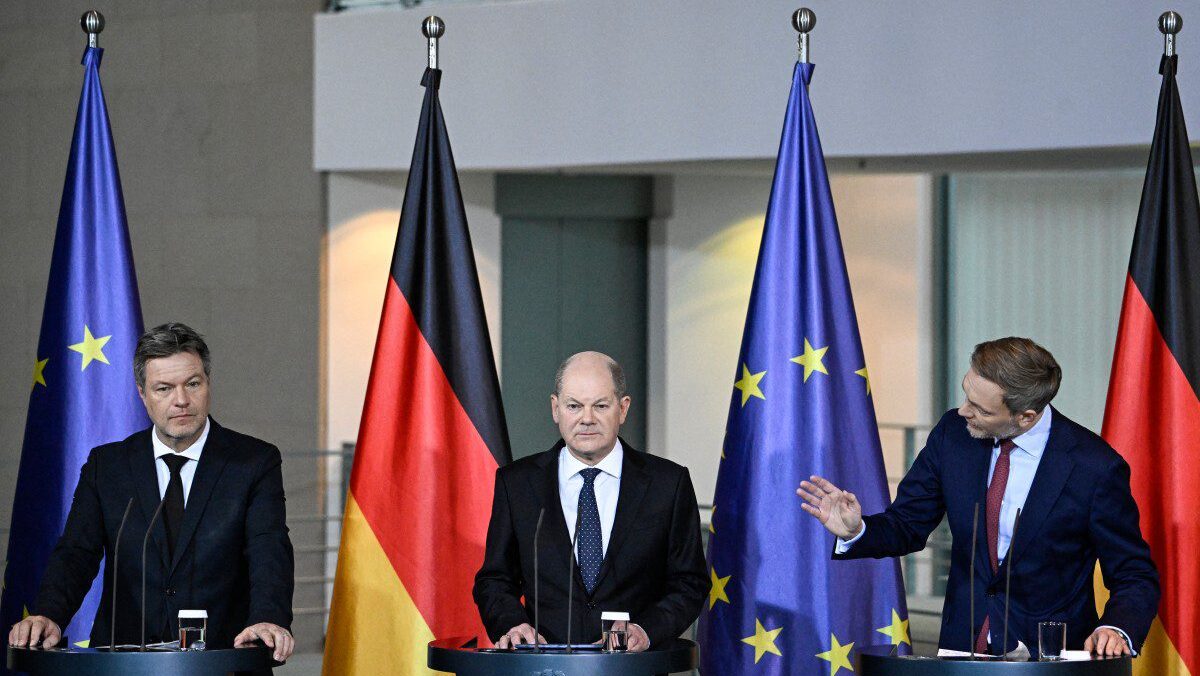
Finance Minister Christian Lindner (R) gestures as he speaks next to German Chancellor Olaf Scholz during a joint statement with German Minister of Economics and Climate Protection Robert Habeck (L) on December 13, 2023 at the Chancellery in Berlin, after reaching a last-minute deal to end a budget deadlock.
Photo: Tobias SCHWARZ / AFP
Opposition parties have lambasted the German government for its 2024 budget which is certain to raise inflation, putting an even larger burden on households, while aid for Ukraine will be expanded.
Germany’s three-party coalition of the social democratic SPD, the Greens and the liberal FDP announced an agreement on Wednesday on a budget for next year after a month of wrangling following a constitutional court ruling that upended the government’s financial plans.
The ruling left a €17 billion hole in the budget, which the government has decided to fill through cuts and tax hikes. “The government will stick to its goals … but we must do so with less money which means cuts and savings,” Chancellor Olaf Scholz said.
According to the plans, the so-called climate and transformation fund—which finances measures such as the renovation of old housing stock and oil and gas heating systems—would be reduced by €12 billion in 2024. An increase in the CO2 surcharge on fuel, heating oil and gas will be increased faster than previously intended, while measures to modernise the German railway will be funded from elsewhere, for example through privatisation. Subsidies for buying electric cars will be ended earlier than planned and there will be less support for the solar power industry.
The budget compromise also foresees new levies on kerosene fuel for domestic flights and on the production of plastic.
While Finance Minister Christian Lindner promised a €15 billion package of tax cuts for households, as well as a €3 billion reduction in electricity taxes, conservative politicians and media believe taxpayers will bear the brunt of the budget. As news website Tichys Einblick points out:
Companies usually pass on the costs of the CO2 tax to consumers. But that’s just the beginning: consumers are paying more for heating, petrol, diesel and electricity. As a result, the prices for everything that is produced and sold are rising, because every product contains energy for production and transport—which is further made more expensive. This is called inflation. Where does it end?
“Gasoline, electricity, food, oil and gas, everything that is essential for life will become even more expensive in 2024. Once again, the red-green lunatics are squeezing the citizens,” member of the Bundestag for the conservative AfD, Martin Reichard tweeted. He added: “Climate protection, support for Ukraine, spending on mass migration and the so-called citizens’ allowance, 47% of which is paid to migrants (especially Ukrainians) are more important than the welfare of Germany!”
Die Ampel-Versager haben sich darauf geeinigt, wie sie die Schuldenbremse 2024 zumindest kurzfristig scheinbar einhalten können:
— Martin Reichardt, MdB (@M_Reichardt_AfD) December 13, 2023
Der CO2-Preis wird nochmal erhöht.
Benzin, Strom, Lebensmitten, Öl und Gas, alles, was lebensnotwendig ist wird 2024 noch teurer.
Ein weiteres Mal… pic.twitter.com/F3eZDLhLrV
Distrust with the coalition has been growing steadily for the past few months, mainly regarding failed migration policies and the Green agenda. The Greens early this year enjoyed the support of 21% of the population, but are now polling at 12%. AfD, which opposes most of the government’s policies, is reaping the rewards and is now the second strongest party nationally according to polls, with a 22% backing. Centre-right alliance CDU/CSU meanwhile is polling at 30%.
AfD have also been criticising the continued backing of Ukraine. Olaf Scholz said support for Ukraine would continue, and, despite the financial difficulties, Germany will double support for Kyiv to €8 billion next year compared to 2023, with an additional €6 billion for Ukrainian refugees. AfD co-leader Tino Chrupalla said that even “U.S. citizens are tired of their money being spent on foreign wars,” therefore “Scholz must also stop spending billions on the Ukraine war.”
